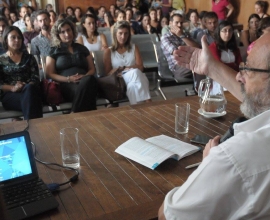A manual for citizen services by the Uruguayan Ministry of Social Development will narrow the gap between formal and effective rights
The National Directorate for Territorial Management of the Uruguayan Ministry of Social Development presented its Technical Guidance Manual for Citizen Services, which was prepared with the support of EUROsociAL.
The manual was presented this February and represents a tool that will make it possible to ensure that all Uruguayan citizens have access to the same opportunities and can effectively exercise their rights. The presenters were Daniel Olesker, Uruguay's Minister of Social Development; Martin Rodríguez, Director of the DNGT; and Romina Napiloti, Head of the Continuous Improvement of Citizen Services Department. Also in attendance was Juan Fernández Trigo, European Union Ambassador to Uruguay. The manual is aimed at all members of teams that carry out citizen service functions in the MIDES. It was prepared with the support of the Social Policies area of EUROsociAL II, a programme financed by the European Union, which made the experience of Brazil in this field available.
The opening was led by Martín Rodríguez, who indicated that the manual represents the fruit of a long process of collective construction which involved the workers and managers of the MIDES' territorial teams. “The goal was for the manual to be more than just another publication on the library shelves of the MIDES but instead to serve as a permanent reference tool that makes it possible to close the gap between formal and effective rights. The working sessions in the territory, the training courses, and the collective construction process guarantee that this will be the case” said the DNGT director. He also indicated that the manual represents a social technology that will add value to the work of the MIDES.
Next, Romina Napiloti presented the content of the manual and described in greater detail the methodology used to prepare it. In particular, she indicated that the manual made it possible to construct a memory, systematise experiences, and reach consensus on the actions to be carried out on a day-to-day level, and also to practices to the new regulatory frameworks of expanded rights in Uruguay. In particular, the manual contains definitions and best practices, technical guidance on providing non-discriminatory service, and technical guidance on protecting sensitive data. “The manual makes it possible to agree on the meaning of service, guidance and advising, as well as approach, reference, follow up, referral and coordination from the service teams. What practices they induce, which are more effective and efficient, and how errors can be avoided”, indicated Napiloti.
For his part, the European Ambassador saluted the progress made in Uruguay in the area of social cohesion. “EUROsociAL II seeks to impact social cohesion by closing gaps in the living conditions of the population so that everyone has access to the same opportunities. Uruguay has taken a very interesting approach to this theme: working so that the population is better served and has greater access to its rights. This manual contributes to this, it strengthens the State and can have a multiplier effect on the social activity of the country”, indicated Fernández Trigo.
Lastly, the Minister of Social Development highlighted the importance of the manual in terms of how it organises the service workflow starting from when a person arrives at a service office and also providing content about what each phase represents. In addition, it provides useful tips that were created both from both the theory and practice of the work in the territory. “The goal was to improve the experience of arrival to the territory, efficiency and to cover demand. We can feel satisfied that we have achieved the objective”, indicated the Minister.
IILA

